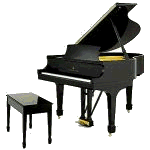

Composers from Amazon.com's Get Started in Classical:
| Bach | Glass | Schubert |
| Beethoven | Mahler | Stravinsky |
| Copland | Mozart | Tilson Thomas |
| Corigliano | Mutter | Wagner |
| Debussy | Pärt | Zimerman |
| NEW! Huang Additional composers and musicians |
||
Wolfgang Amadeus Mozart
This is from Amazon.com's Get Started in Classical.
Mozart's miraculous creativity rewards listening at any stage
For those who shy away from classical music because they feel they lack the necessary "background," Wolfgang Amadeus Mozart (1756-1791) is the perfect ticket. His greatest compositions cut to the quick and establish an immediate bond with the listener, as if Mozart had discovered a code in sound to articulate the emotional reality that lies at the core of our humanity. There's an almost miraculous quality to his creativity, whether you consider Mozart's beginnings as a child prodigy (he composed his first symphony--to the glee of the "Mozart for babies" marketing strategists--at the age of 8) or his versatility in mastering every musical form of his era. Symphonies, string quartets, sonatas, Masses, concertos, and operas poured from his pen at a dizzying speed (a famous example is the overture to Don Giovanni, written in one frantic all-nighter), often with the seeming effortlessness of plucking a piece of ripened fruit.
But don't be fooled into equating that flow of inspiration with superficiality. Take the two piano concertos on this disc, which were written back-to-back within the space of a single month in early 1785. They represent Mozart at the peak of his powers and form a complementary pair, like the twin comic and tragic masks that symbolize the theater. Both are shot through with the same highly dramatic sensitivity that makes Mozart's operas so perennially appealing. There's even a practical reason for that analogy: Mozart frequently wrote his concertos for performance during the Lenten season, during which the theaters were required to remain closed. The first concerto here displays the composer at his darkest and most brooding; it is set in the same key (D minor) that he seemed to associate with death (the opening of the Requiem) as well as the demonic (Don Giovanni). Beethoven responded so deeply to this music that he wrote out his own cadenzas (the lengthy solo passages for the pianist near the end of the first and third movements) at the point where Mozart would have improvised in live performance. The C Major Concerto by contrast evokes a sense of brilliant festivity from the start, punctuated with trumpets and drums, and unfolds with an almost unbelievable generosity of musical ideas.
Another aspect of the drama in these concertos is the constant trade and dialogue--sometimes playful, sometimes adversarial--between soloist and orchestra. Mitsuko Uchida is one of the most sensitive interpreters of Mozart to emerge in this generation, and she plays the protagonist here with total involvement and clean, beautifully detailed support from conductor Jeffrey Tate. Try to follow the proceedings from the piano's point of view, and you'll find yourself completely immersed.
Thomas May, Classical Editor
More Mozart can be found in can be found in Musical Information, Recommendations for Adults and Recommendations for Children.
O'Connor Music Studio Recommendations
lists Books, CD's, Cassette Tapes, Computer Programs, Music Scores DVD's, Videos and more
from amazon.com, as well as several other sources.
 If you are looking for ideas for children's books, cd's, cassette tapes, computer
programs, games and toys, click here for some ideas.
If you are looking for ideas for children's books, cd's, cassette tapes, computer
programs, games and toys, click here for some ideas.
Many thanks to Dearest for everything!
is located
in Fairfax, Virginia
Over 30 Years
~~
Piano, Organ
Electric Keyboard
Accompanying
Email Mary O'Connor
All rights reserved.
Site design and maintenance by
O'Connor O'Riginals Web Design